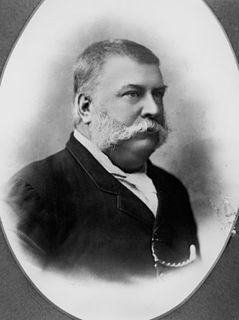
The Family First Party was a conservative political party in Australia, in existence from 2002 to 2017. It was founded in South Australia and enjoyed its greatest popularity in that state.

George Henry Thorn (junior) was a Member of the Queensland Legislative Assembly and a Premier of Queensland, Australia.

The Tamil Nadu Legislative Assembly alone has powers to legislate laws covering state subjects in the Indian state of Tamil Nadu. It has a strength of 235 members of whom 234 are democratically elected using the First-past-the-post system. The remaining member is nominated as a representative of the Anglo-Indian community. The presiding officer of the Assembly is called the Speaker. The term of the Assembly is five years unless it is dissolved earlier.

Elections were held in the Australian state of Queensland on 2 April 1938 to elect the 62 members of the state's Legislative Assembly. The Labor government of Premier William Forgan Smith was seeking a third term in office. During the previous term, the Country and United Australia parties had emerged from the united Country and Progressive National Party, which had represented conservative forces for over a decade.

General elections were held in Kenya between 25 September and 2 October 1956, with additional elections in March 1957 for eight African constituencies, the first in which Africans could be elected. The elections in 1956 were open to Europeans and Indians. In the European constituencies the results saw eight Independent Group members and six independents elected.

General elections were held in East Africa Protectorate in March and April 1920, the first elections in the country. The Legislative Council had previously consisted entirely of appointed members. The new Council consisted of 11 elected white members, two appointed members representing the Indian population and one appointed member representing the Arab population, as well as a number of appointees by the Governor. This allowed the Council representative, although not responsible government. The territory became Kenya Colony on 23 July.

General elections were held in Kenya Colony on 2 April 1924. The elections were the first under a new Constitution which saw suffrage extended to Indians and Arabs, who were allotted five and one elected seat in the Legislative Council respectively, alongside the eleven elected seats for the white population, although appointed members were still the majority. Whilst all adult Indian residents were given the right to vote, in the Arab community only men literate in Arabic or Swahili and resident in the country for two years were enfranchised, as the community had requested that women not be given the right to vote. One member was appointed to represent the majority black population.

General elections were held in Kenya Colony on 12 February 1927.

General elections were held in Kenya Colony in 1931. Five of the eleven white seats in the Legislative Council were uncontested, with Lord Delamere amongst those returned unopposed. Unlike previous elections, which were boycotted by the Indian population, this time the community participated. Fourteen candidates including two independents contested the five Indian seats. However, seven of them declared that they would not take their seats on the Council if elected until the separate voter rolls for whites and Indians were scrapped.

General elections were held in Kenya Colony in 1934, with the first seats elected on 28 March. Four candidates were returned unopposed in the eleven Europeans constituencies, whilst the remaining seven constituencies were contested by 18 candidates. For the five Indian seats, there were 17 candidates. Voter turnout in the White seats was the highest since elections were introduced. The Council convened for the first time after the election on 24 April.

General elections were held in Kenya in 1952.

General elections were held in Northern Rhodesia on 20 March 1959, although voting did not take place in two constituencies until 9 April. The United Federal Party (UFP) was expected to win the elections, and did so by taking 13 of the 22 elected seats on the Legislative Council.
Legislative Council elections were held in Mandatory Palestine in February and March 1923. However, due to an Arab boycott of the elections called by the fifth Palestine Arab Congress, the results of the election were annulled, and an Advisory Council was appointed instead.
Elections to the Legislative Council were held in the Colony of Natal in September 1892. The initial result was a victory for the anti-responsible government party, which won 14 of the 24 seats. However, this was later overturned as four anti-responsible government members lost their seats after their election was annulled, and the by-elections were won by pro-responsible government candidates.
This is a list of members of the South Australian Legislative Council from 1881 to 1885.

The 1917 Bay of Islands by-election was a by-election held on 19 March 1917 during the 19th New Zealand Parliament in the Northland electorate of Bay of Islands. The by-election came about because Vernon Reed's win in the 1914 general election had been declared void by an electoral court, and Reed barred from standing for a year. The seat was won by William Stewart, Reed's Reform Party colleague, in the resulting 1915 by-election. When Reed became eligible again, Stewart resigned and Reed won the 1917 by-election unopposed.

General elections were held in Northern Rhodesia on 29 August 1941. All five Labour Party candidates won their seats.

The Kenya Coalition was a political party in Kenya.
The elections in India in 2019 that include general election, by-elections to the Lok Sabha, elections to the Rajya Sabha, elections to six state legislative assemblies and numerous other by-elections to the state legislative assemblies, councils and local bodies.








